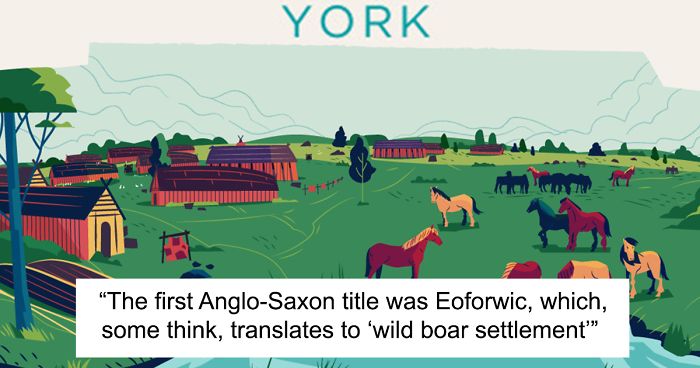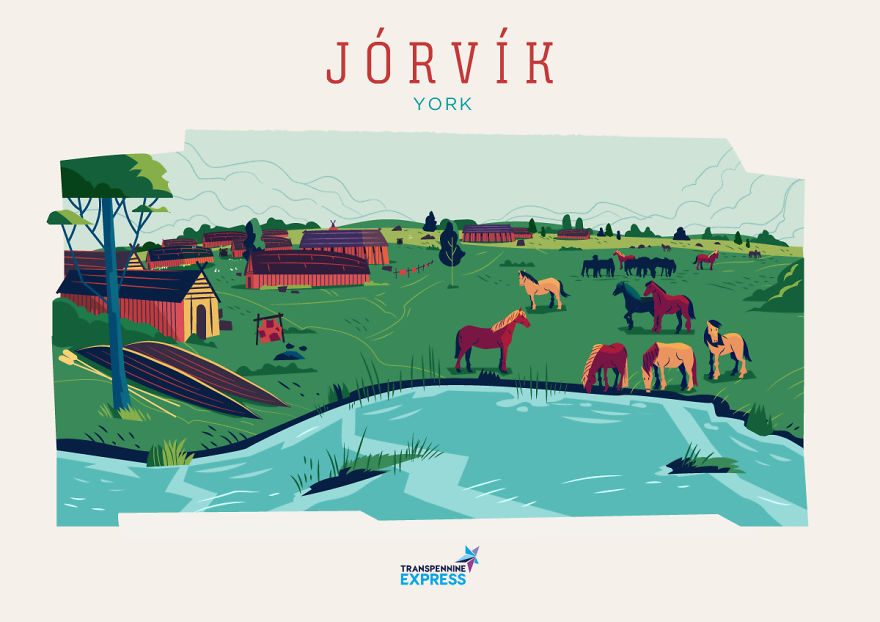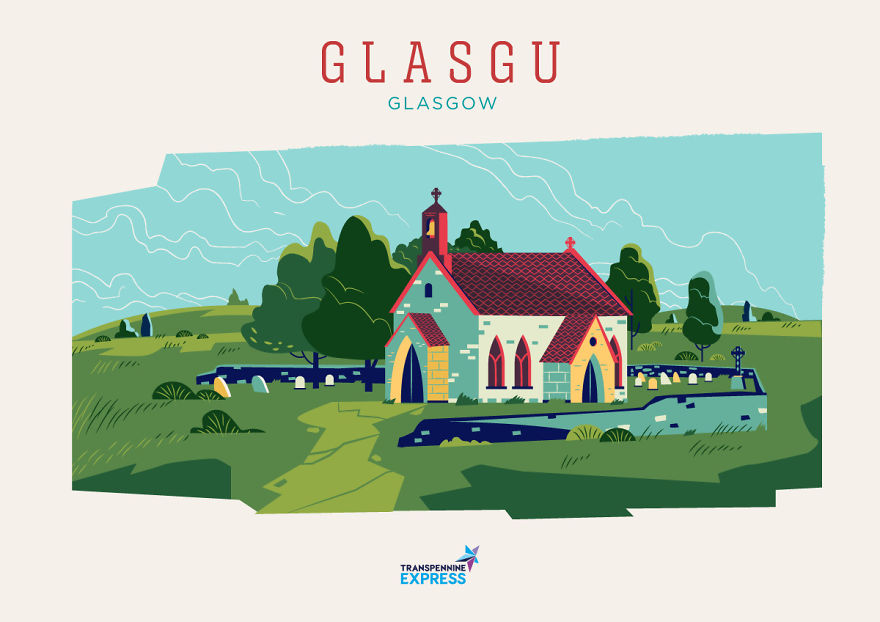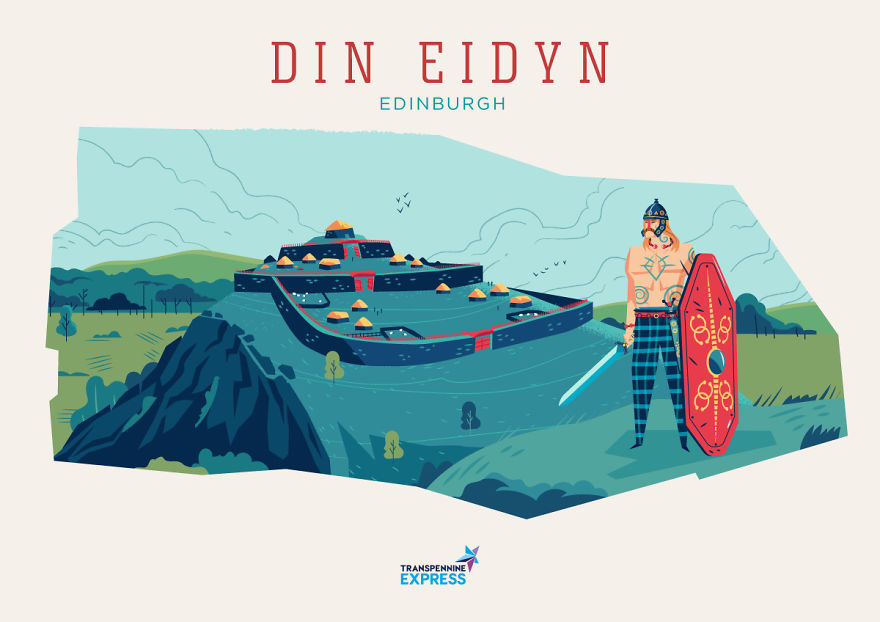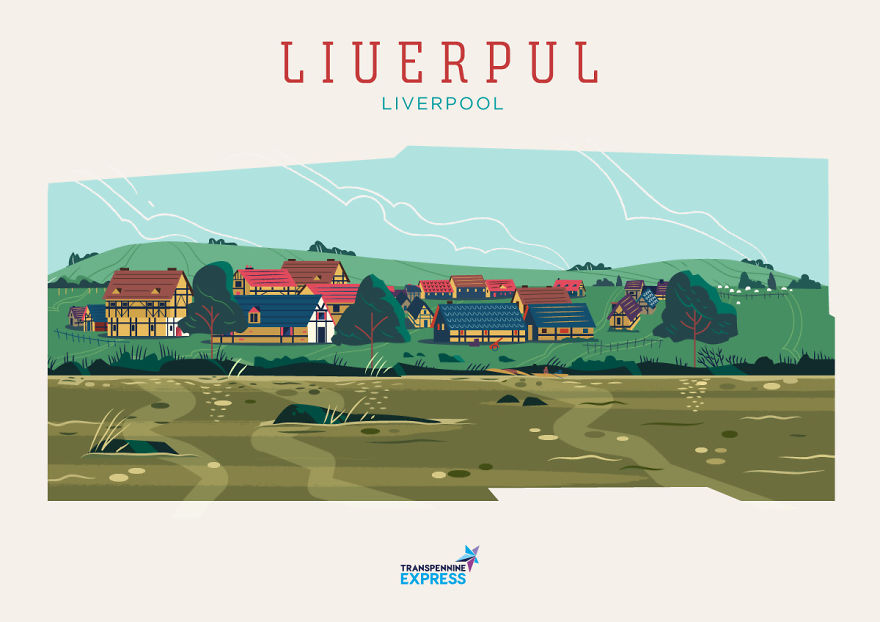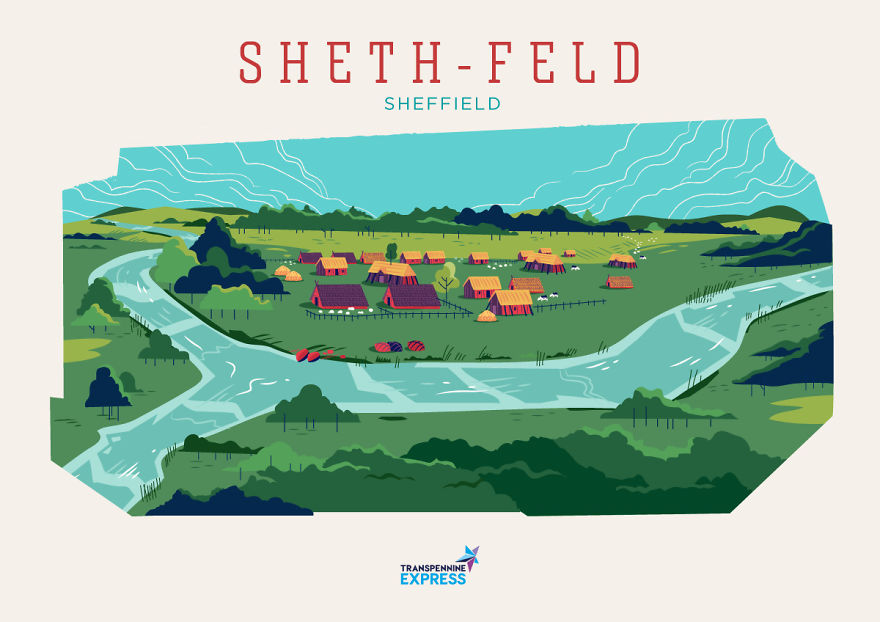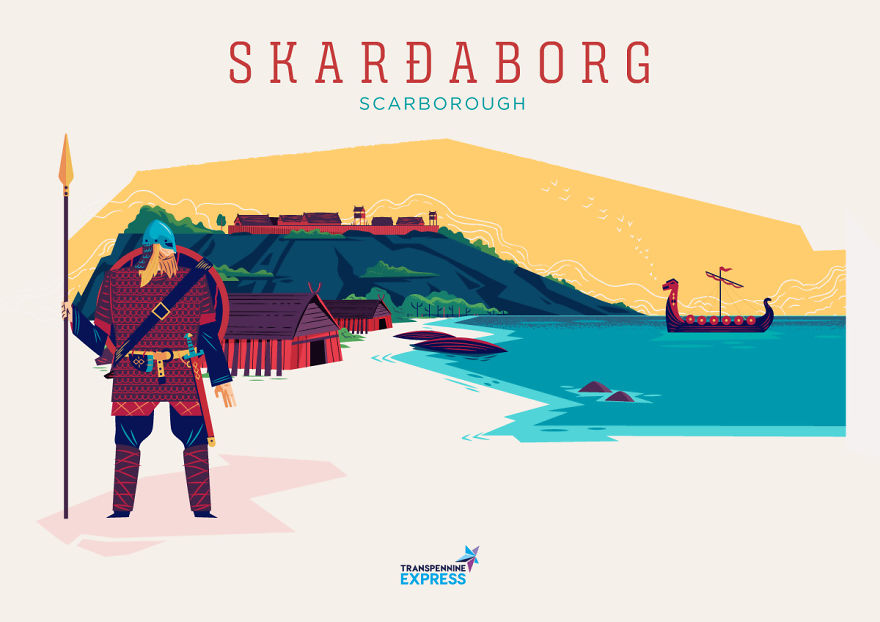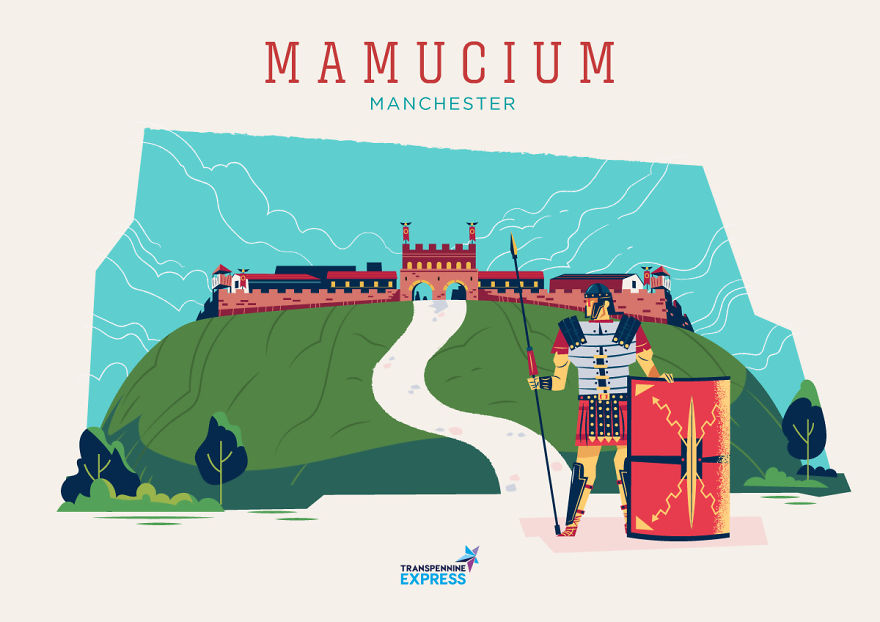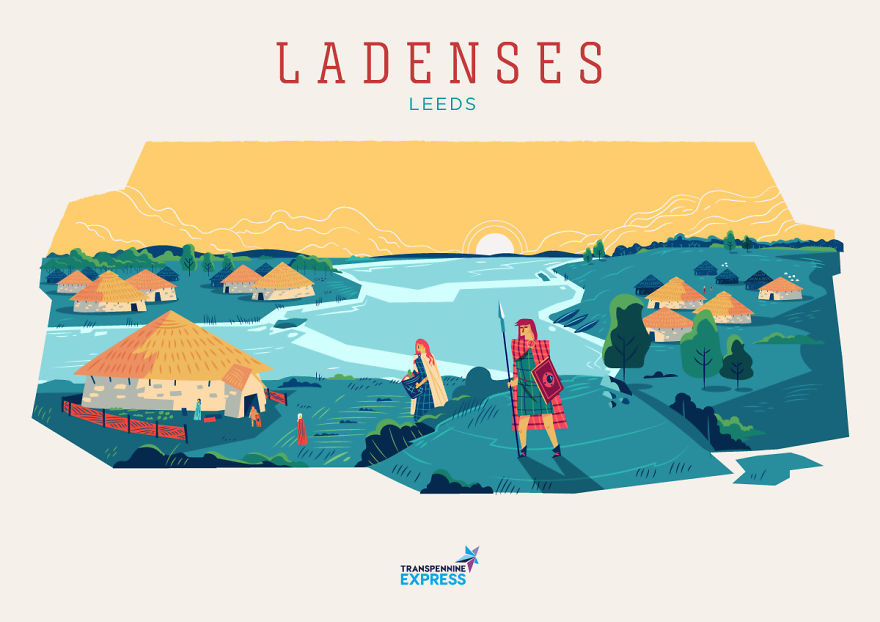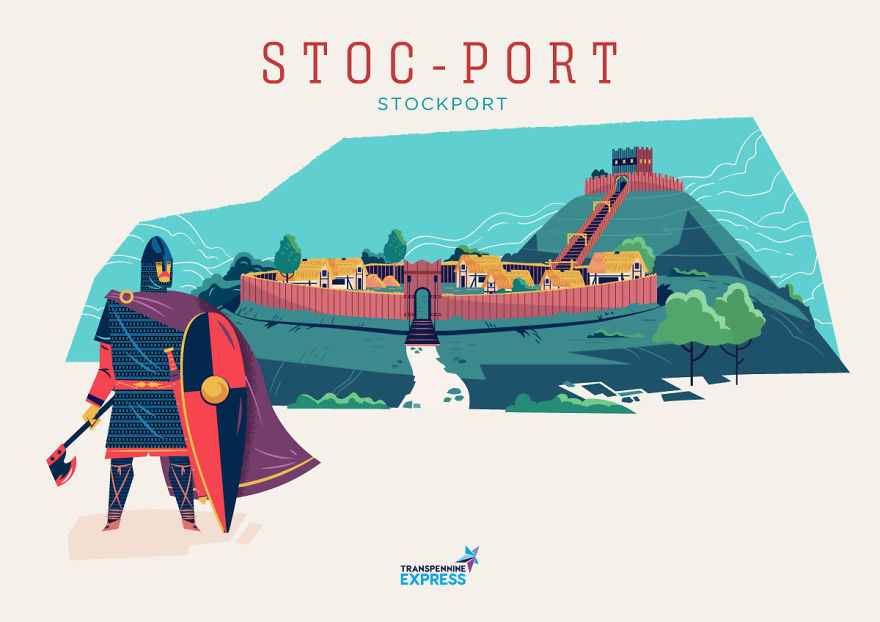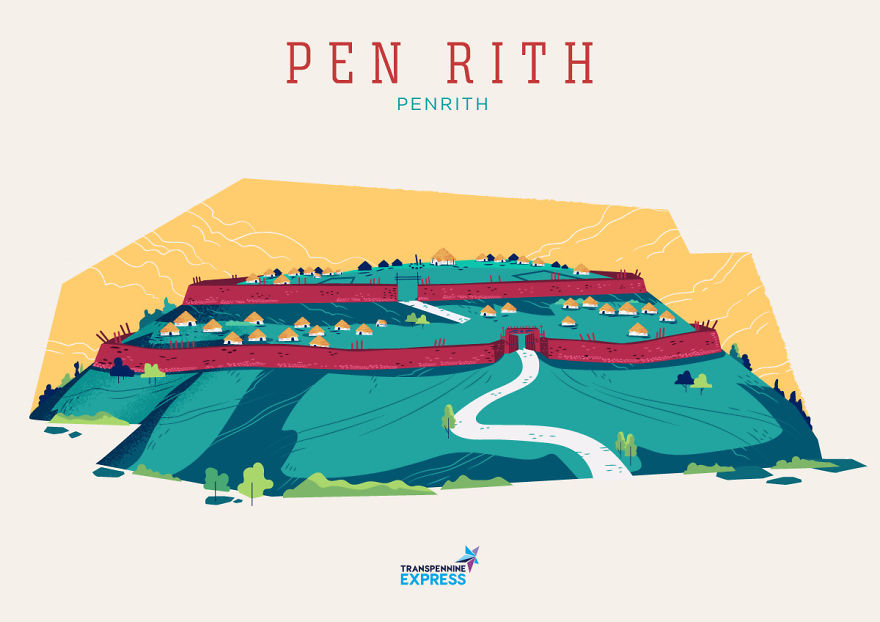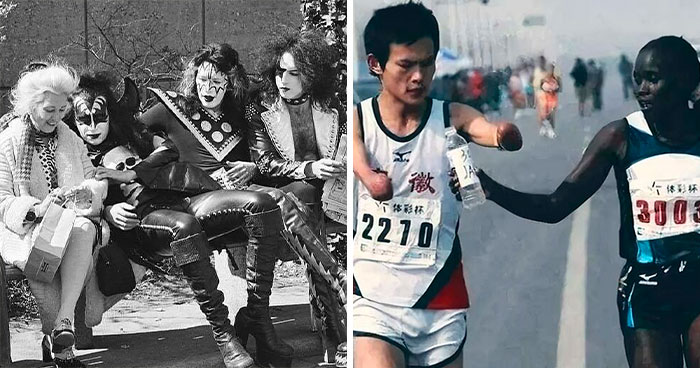Have you ever wondered where some UK cities got their names? Well, the North of England in medieval times was a violent place besieged by battles. Both the Celts, the Anglo-Saxons, and the Romans were conquering, dividing, and taking the country for their own.
Across the centuries and up until now, their influence remains through their language and the names they gave to settlements. Whether that’s the Romans in Manchester, the Vikings in York, or the Celts in Scotland, their legacy lives on through the cities of the modern-day United Kingdom.
Innovative artists at Transpennine Express have been delving into the history of 10 northern cities and towns. They have portrayed their origin stories with some beautiful illustrations.
More info: tpexpress.co.uk | Instagram | Facebook | twitter.com
This post may include affiliate links.
Jorvik (York)
Anyone who’s spent any time in York will know there is a heavy Viking influence on the area. The Vikings defeated Anglo-Saxon rule in 865 AD and took not just the land, but its name too. The first Anglo-Saxon title was, in fact, Eoforwic, which, some think, translates to “wild boar settlement.” Once Viking authority was established, it was adapted to Jórvík, which is believed to have meant “horse bay” to the new residents.
Glasgu (Glasgow)
The early Gaelic name of the city was first Glaschu or the Cumbric Glas Cau, which is believed to mean “Green Glen” or “Green Valley.” It wasn’t until 1116 that the common name Glasgu began to appear when a religious community was established in the settlement and a church was built. This happened with the arrival of Saint Kentigern, also known as Mungo. The ancient site of the chapel is where the current cathedral stands, built in the 12th century and dedicated to St. Mungo.
In Welsh Glas is Blue. Its fascinating that the same language (Gaelic) differs between Irish Welsh and Scottish.
The Celtic languages are in two groups: Northern (Gaelic) = Irish, Scottish & Manx; Southern (Brythonic) = Welsh, Cornish, Breton & Galician
Load More Replies...St. Mungo??? Like, St. Mungo's Hospital for Magical Maladies and Injuries???
OMG ST. MUNGO WAS AN IRISH WIZARD-SAINT!!!
Load More Replies...Did you know that a settlement becomes a hamlet once they build a church? I'm not sure the qualification for township. Town hall perhaps?
Not in the UK. "In British geography, a hamlet is considered smaller than a village and distinctly without a church or other place of worship". https://en.wikipedia.org/wiki/Hamlet_(place)
Load More Replies...Din Eidyn (Edinburgh)
Many believe the name of the city to translate simply as “Castle Rock,” and for anyone that visits, it’s easy to see why this name fits so well. However, in 600 AD, Edinburgh was referred to as Din Eidyn, which is said to mean “fort of Eidyn,” a specific kind of Celtic hill fort. What was once up for a little deliberation was whether Eidyn was, in fact, a reference to Edwin and directly related to the 7th-century King Edwin of Northumbria. This has now been disproved by local historians with it questionable as to whether Edwin ever made it far enough north to give his name to Edinburgh.
Liuerpul (Liverpool)
The Mersey is synonymous with Liverpool, and it seems the river even had an impact on the city’s original moniker. The name Liverpool can be traced all the way back to 1190 when it was known as Liuerpul, which means a “pool or creek with muddy water.” While it might not inspire thoughts of the glistening city we know today, it resembles its humble beginnings. Over the years, it’s evolved through different spellings but still stays true to its origins, with the pool that contained the muddy water thought to refer to the inlet that still flows into the Mersey today.
Sheth-Feld (Sheffield)
The city’s original name is Old English or Anglo-Saxon and is thought to date back to the arrival of the Anglo-Saxons in this part of the country. This could be anywhere between the 6th and 9th centuries. The name itself derives from the River Sheaf, with sheaf being a corruption of shed or sheth, meaning to “divide” or “separate.” Feld in Old English means “a forest clearing.” It’s safe to assume that Sheth-Feld, therefore, refers to a settlement in a forest clearing near the confluence of the River Sheaf and the River Don.
Skardaborg (Scarborough)
While York takes most of the Viking credentials, Scarborough had a vital role to play too. It was christened as Skarðaborg in 966 AD by a Viking raider called Thorgils Skarthi. Having defeated the Anglo-Saxons to take over the settlement, Skarthi couldn’t resist a show of personal strength and vanity by naming it after himself. The Viking word Borg, where Borough is derived from, means “stronghold” or “fortress.” It is thought that direct translation means “Skarthi’s Stronghold.”
Strange fact, outside London, Scarborough is the most visited place in the UK.
Mamucium (Manchester)
Manchester has its roots firmly in the time of the Romans, which is reflected in its earlier name. It’s thought it was named in the 1st century around AD 78-86, following the creation of a small fort on top of an outcrop at the convergence of the River Irwell and River Medlock. The name Mamucium means “breast-shaped hill” and is a Latinized form of the Celtic meaning. It makes sense, as the fort was used by the Romans to defeat a local Celtic tribe.
Ladenses (Leeds)
The inaugural title of the city is still a little up for debate. In some circles, the first designation was Loidis, which was then changed to Ledes. The latter is how it was referred to in the Domesday Book after the Norman invasion. For those in this camp, it is said to mean a forested area of the Celtic Kingdom of Elmet, which was in existence until the 7th century. Others believe the original name to be Ladenses, which is a Celtic term for “people of the fast-flowing river”; quite different from Leeds!
Nowadays it's "people of the fast-flowing mouths". Just kidding, ya bunch'a Northern nutters!
Stoc-Port (Stockport)
Sometimes the simple names make the most sense. Take Stockport, for instance, which quite literally translates to “a castle in a wood.” The original settlement was Saxon and was situated on a cliff overlooking the River Mersey. It was a prominent spot where many Roman roads met and crossed the river. The first name, as it was then, derives from two specific words: Stoc, which refers to a “castle,” and Port, which means a “wood.”
Pen Rith (Penrith)
Now this one is still often called into question. Of all the towns and cities on our list, the origin of the name Penrith is still a little foggy. It’s not just that—for some, it’s also shrouded in controversy. For many, it is thought to come from the Celtic words “penn” and “rid,” which means “hill ford.” Those on the other side of the argument also feel that the origins are Celtic (specifically Cumbric) but that it derives from “Pen Rith,” which translates to “red town.”
This reminded me of that scene in Ron Burgundy when he explains the etymology of 'San Diego' “Discovered by the Germans in 1904, they named it San Diego, which of course in German means ‘a whale’s vagina.'” In other words, there are well researched and known etymologies of these place names and they don't all match up to the texts here....
Germans? 1904? You’re talking about the San Diego in So Cal? Discovered - ignoring the Spaniards that had been there 400 yrs. and even redefined the name to mean something even sillier than your straying from reality.
Load More Replies...They are in the style of travel company posters from the 20's and 30's, and comissioned by Transpennine Express, which is a railway company.
Load More Replies...I did enjoy this a a list of new things to research. Not all were accurate, still interesting, and I enjoyed the art work. T
Many thanks for this post! I was thinking about conducting a research project on the history of the English language, and you gave me an idea.
That's cool and all but could someone please explain to me how Bitchfield came to be? xD
This reminded me of that scene in Ron Burgundy when he explains the etymology of 'San Diego' “Discovered by the Germans in 1904, they named it San Diego, which of course in German means ‘a whale’s vagina.'” In other words, there are well researched and known etymologies of these place names and they don't all match up to the texts here....
Germans? 1904? You’re talking about the San Diego in So Cal? Discovered - ignoring the Spaniards that had been there 400 yrs. and even redefined the name to mean something even sillier than your straying from reality.
Load More Replies...They are in the style of travel company posters from the 20's and 30's, and comissioned by Transpennine Express, which is a railway company.
Load More Replies...I did enjoy this a a list of new things to research. Not all were accurate, still interesting, and I enjoyed the art work. T
Many thanks for this post! I was thinking about conducting a research project on the history of the English language, and you gave me an idea.
That's cool and all but could someone please explain to me how Bitchfield came to be? xD

 Dark Mode
Dark Mode 

 No fees, cancel anytime
No fees, cancel anytime 


